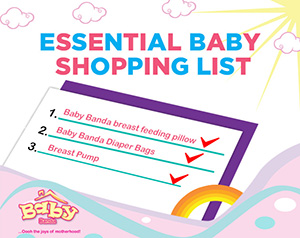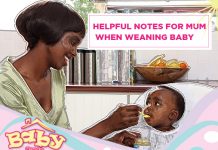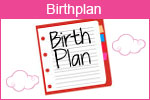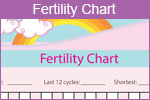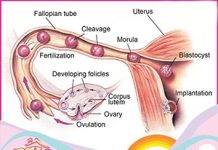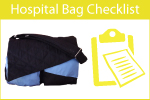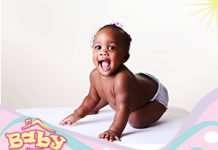| CATEGORIES | ITEM | USAGE |
| Feeding the baby (Breastfeeding) | Breast pump | You will need this if you intend to breastfeed for long. They are manual pumps as well as an electric pump. Choose a pump that is easy to use and clean. Ask the shop attendant to demonstrate usage |
| Nursing bras | The trick to buying nursing bras is not to buy too early and too many at one go. The reason: breast size fluctuates. Cup size is the largest during the early days of breastfeeding and will shrink after a few months of breastfeeding. It is important not to wear an underwired bra during pregnancy and while you are breastfeeding. Wearing underwire bras during pregnancy will affect the development of milk glands resulting in clogged ducts during breastfeeding. 100% Cotton is best as it allows air to circulate and prevents yeast infection. | |
| Nursing pads | An important item when breastfeeding; breast pads help prevent embarrassment and staining from leaking breasts. You can buy washable pads as they tend to be cheaper. Wearing soaked pads for any length of time is not recommended as this makes nipple conditions such as yeast more common. When washing reusable pads, be sure to avoid liquid fabric softener as it can impede the pad’s absorbency. | |
| Baby Banda’s Breastfeeding pillow | A nursing pillow allows you to breastfeed comfortably by supporting the weight of the baby. The Baby Banda Nursing pillow has multiple uses like supporting the back of the baby when he learns to sit and propping the baby when he is having nose congestion or for exercise. | |
| Feeding the Baby (Bottle feeding) | Sterilizing | If the cost is an issue one can purchase baby sterilizing liquids e.g. Milton’s, Sterol etc. Boiling and use of boiling hot water is also an effective way of sterilizing |
| Bottles | There is a wide variety of bottles to choose from in the Kenyan market. However, one should choose a bottle that is durable, easy to clean, and with a soft enough teat for ease of suckling by the baby | |
| Bottle scrub brush | Comes in different shapes and materials. Sponge brush cleaners clean better. They should also be sterilized and replaced frequently. | |
| Bottle detergent | Any non-toxic cleaning detergent can be used | |
| Teats | Choose teats that are better for teeth development. Choose the appropriate size for your baby. Buy two initially as you need to change the teats when your baby grows. Please note that most teats are not interchangeable and might not fit a different brand of bottle. Most teats must be discarded after two months of use. Check the usage instructions for your brand of teats. | |
| Nursery | The Baby Cot or Bed | The bed or cot should be firm and made of safe material. To save money, one can purchase a bed that is adjustable and versatile such that it can be used for a longer period of time, e.g. the sleeping height can change as the baby learns how to stand to avoid falls etc |
| Baby Banda Fitted Cot Sheets | These are fitted cot sheets made in cotton or flannel fabric for bed sizes 2x4ft or 2.5x5ft. To save cash one can purchase just the fitted sheet and where budget allows, can do a full set (fitted sheet and top flat sheet) | |
| Baby Banda Baby Pillow Set | Small Baby Pillow and Tube Rest i.e Lumber roll. The small pillow is used to raise baby to prevent food reflux and the lumbar roll is used for Tummy Time. Tummy time for the baby is extremely important for the physical development of the baby. | |
| Baby Banda Mackinstosh mat | This is a mackintosh mat with a flannel top cover. It can be used for many versatile purposes like bathing or as a crawling mat for babies to exercise and play. It can also be used for changes | |
| Layette (basic collection of clothes and accessories babies will need through his first few weeks) | Tops Pants Rompers / Bodysuit Sleep Suits | It is better to get front-button shirts instead of pullovers. It is sensible to get several sizes larger as kids grow at an amazing rate. |
| Receiving blankets | To wrap the baby up. Some experts advocate for swaddling the babies and others don’t. Follow your baby’s cues, if they like it then you can go ahead and swaddle them. | |
| Booties and scratch mittens | Babies should wear mittens up to two months of age as babies at that age is trying to learn the world around them through their sense of touch. Try to get mittens and booties as small as possible for newborns. | |
| Towels and face cloth | To save money you can use nappy or washable diaper cloth, it is not only useful for diapering but to towel dry the baby, wiping the saliva and burps. As it is 100% cotton, it absorbs water very well and dries very easily too. To make small pieces of face cloth out of a diaper cloth, Cut the diaper cloth into smaller pieces and hemmed the edge using tape binders to prevent the ends from frilling. Each piece of cloth diaper can be cut into 6 pieces of face cloths. | |
| Bathing and changing accessories | Bath Tub/ container for a sponge bath | You can bath the baby even before the stump of the umbilical cord falls off which usually occurs in the second week after birth. You could also squeeze drops alcohol from alcohol swaps onto the cord to clean and dry it. Always use cooled boiled water to wipe the areas around the baby’s eye and face starting from the cleanliest part of the face, which is the eye. Buy a good size of tub taking into consideration the growing baby so that you might not need to change it too soon. |
| Baby Banda Changing Mats | These are small mackintosh mats used for diaper changes. Fits snugly into the Diaper Bag | |
| Small dish container | 10-12 inches diameter. To wipe the baby’s eyes and face. Remember to use only boiled water during the first month as newborns have very sensitive skin. This is also used for diaper changes as it is recommended that you use water and cotton wool during this time | |
| Cotton wool | It is actually more economical to get big rolls of cotton wool than balls of cotton and they work equally well if you soak them in water. | |
| Sterile cotton swabs & Cord spirit | To use on the umbilical cord. Some hospitals provide this, so check with your hospital. | |
| Safety pins | For use with cloth diaper but if you are using pilchers (pants worn over the diaper) then this is not necessary. | |
| Diapering necessities | Disposable Diaper / Cloth Diaper | Some people swear by cloth diapers as it is more economical and they claim is able to “breath” better than disposable diapers. For cloth diapers, 24 pieces are good enough for a start. If you use disposable, then get a brand that remains dry and is comfortable for your pocket |
| Cotton wool | Using wet cotton wool to clean baby’s bottom is actually better than using baby wipes as wipes contain fragrances and some babies are allergic to them. | |
| Nappy liners | If you are using cloth diapers, you should get nappy liners as they are easier on the baby’s skin. | |
| Travelling necessities | Baby sling carrier | Buy a sling that is comfortable for both you and the baby. It should provide enough support for carrying the baby. However, in Kenya, the age-old ‘leso’ works just as well as long as you have the right technique tie it |
| Hand wipes | Use this to wipe hands before feeding the baby. | |
| Bottle cum warming bag | Can use it to carry your expressed breast milk. | |
| Others | Thermometer | This is very important to measure your babies temperature if you suspect a fever Digital thermometer: It is cheap and can be used to measure oral, rectal, auxiliary. However, oral temperature taking is not advisable for young children. Rectal measurements are slightly higher than oral measurements. An underarm measurement is impacted by room temperature, so accuracy is more difficult to achieve. Underarm measurements are lower than oral measurements. |
| Nail clipper | Do not use it on newborn babies as the nail bed is still fused to the tip of the nail. Use a scratch mitten instead if you are worried that babies will scratch their faces. However, babies also need to learn to feel so at some point those mittens need to come off. Perhaps when you notice baby is more aware so that he/she will not unknowingly scratch their face. | |
| Laundry washing | ||
| 2 –3 Pails | Good to have a separate pail for washing babies clothes and the adults. Have a few pails to allow soaping and rinsing of clothes. | |
| Clothes hanger for drying | Hanger with clips or pegs for hanging the clothes |



